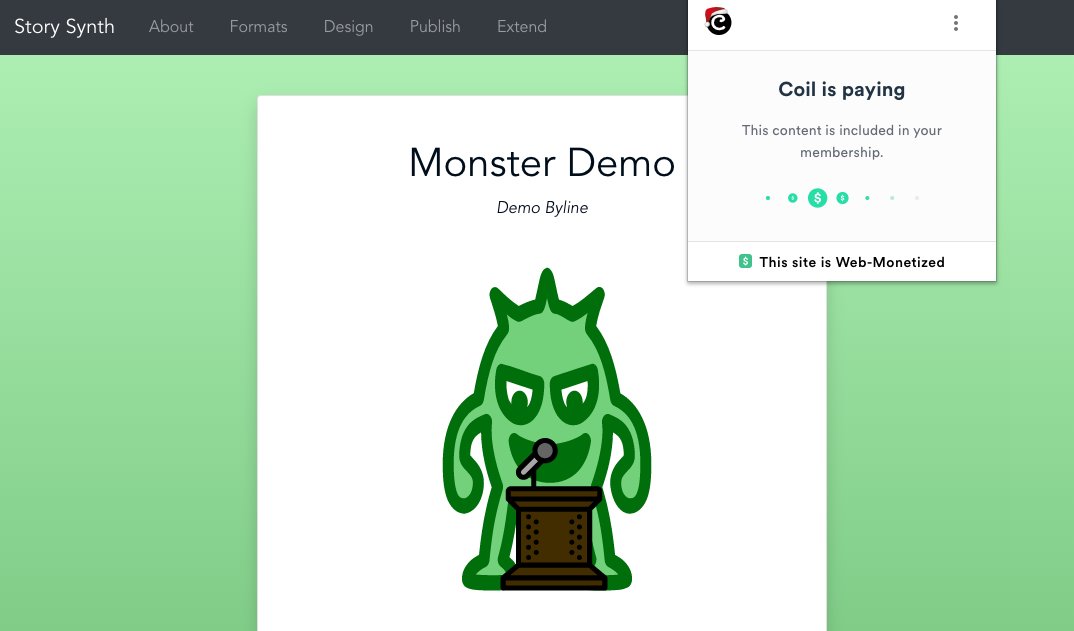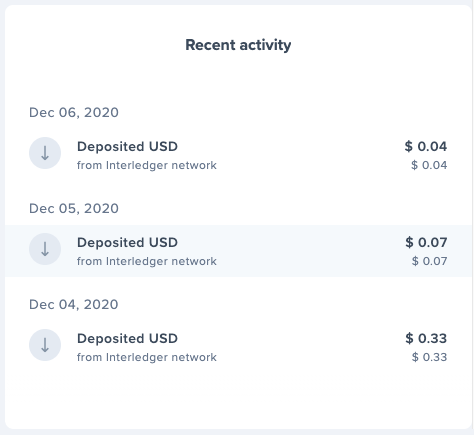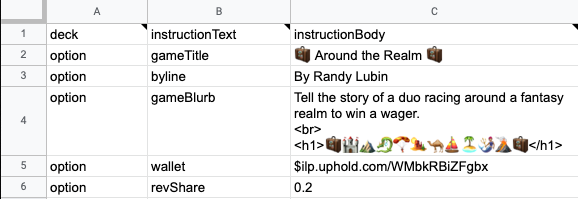
I just added monetization to @StorySynth, in an experimental, bleeding-edge, not-at-all-practical-but-technically-interesting kinda way.
It’s feels kinda cyberpunk!
A quick thread 🧵
It’s feels kinda cyberpunk!
A quick thread 🧵

Story Synth takes advantage of the relatively new Web Monetization Protocol (WMP), which enables the easy flow of payments from a user to a website via their browser.
And by easy – I mean you can set it up with just one line of code!
webmonetization.org
And by easy – I mean you can set it up with just one line of code!
webmonetization.org
With WMP, folks can send micropayments to sites they visit on a minute-to-minute basis with no friction or fees.
I’m testing it out with @Coil right now – I spend $5 / month and 100% of it gets distributed to the websites I visit (if they have WMP enabled).
I’m testing it out with @Coil right now – I spend $5 / month and 100% of it gets distributed to the websites I visit (if they have WMP enabled).
The current base of folks using WMP is tiny but this is an exciting experiment that enables new ways for creators to earn revenue.
Websites like Techdirt, Wired, and Imgur are experimenting with WMP and some are removing ads for visitors that use WMP.
techdirt.com/articles/20201…
Websites like Techdirt, Wired, and Imgur are experimenting with WMP and some are removing ads for visitors that use WMP.
techdirt.com/articles/20201…
Setting up WMP for Story Synth was super easy. I created a free wallet with @UpholdInc and then added the wallet address into the header of the website with one short line of code:
<meta name="monetization" content="$ilp.uphold.com/WMbkRBiZFgbx">
<meta name="monetization" content="$ilp.uphold.com/WMbkRBiZFgbx">
I tested it with my Chrome Coil extension and quickly started receiving a trickle of payments. Granted, they were payments from myself, to myself – but still pretty cool!
It reminds me of playing around with bitcoin in 2010 when the buzz was about impact not price speculation
It reminds me of playing around with bitcoin in 2010 when the buzz was about impact not price speculation

My real interest isn’t making money for Story Synth – it’s creating new revenue streams for game designers
So with just a small tweak, I made it so that designers can share their own WMP wallet with Story Synth and it will auto become the destination when folks play their games
So with just a small tweak, I made it so that designers can share their own WMP wallet with Story Synth and it will auto become the destination when folks play their games
Designers add their wallet w/ an option row in their game’s Google Sheet, along with all their other game data
If they want, they can set a rev share with Story Synth (me). The default is Story Synth gets a 20% cut but they can change it to any % they want (including 0%)
If they want, they can set a rev share with Story Synth (me). The default is Story Synth gets a 20% cut but they can change it to any % they want (including 0%)

Side note - there isn't a built-in way to do rev share yet so I dropped in the Probabilistic Revenue Sharing code which sets the wallet address randomly based on the defined revShare percent
webmonetization.org/docs/probabili…
webmonetization.org/docs/probabili…
I don’t expect anyone to earn substantial revenue anytime soon but WMP a super fun thing to experiment with.
And messing with a new web protocol, that avoids banks and fees, to send cash directly to indie creators – this is the most cyberpunk I’ve felt in a very long time!
/end
And messing with a new web protocol, that avoids banks and fees, to send cash directly to indie creators – this is the most cyberpunk I’ve felt in a very long time!
/end
• • •
Missing some Tweet in this thread? You can try to
force a refresh


